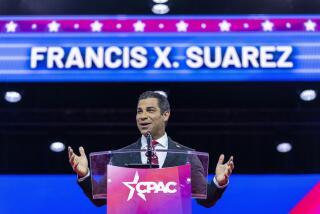Jackson Refuses to Rule Out Run for D.C. Mayor
WASHINGTON — Jesse Jackson, in a situation reminiscent of 1984 when reporters and voters had wondered for months whether he would run for President, faces a familiar question about a new office: Will he run for mayor of the District of Columbia?
“No comment,” Jackson said in an interview here Friday, but he later refused to rule out the possibility of a mayoral race.
He may be the only person in the city who does not have a comment. As the current mayor, Marion Barry, continues to fight allegations that he used illegal drugs, some members of Washington’s local political leadership are casting about for an alternative candidate in the 1990 election.
Meanwhile, Barry said through a spokesman Friday that there is “a 60% chance that I will run.”
As for a Jackson candidacy, its pros and cons are hashed and rehashed everywhere here--from bars to offices to newspaper editorial pages and talk-radio shows.
If Jackson were to run and win, he would gain the experience of holding a public office for the first time. He also would be highly visible, dealing with Congress and the White House, winning a world forum for issues he cares about. Both those factors would serve Jackson well should he make a third run for the presidency in 1992.
On the downside, Jackson would lose much of his freedom to travel. He would be shackled with running a city that, like many others, is suffering from drug problems, murders and a tight budget. Disgruntled voters might complain that he ought to stay home instead of heading off to some world capital.
One small obstacle is that Jackson is a resident of Chicago, not the District of Columbia. But he still has some time to make up his mind. Leona Agouridis of the District’s board of elections office said that, to run in the 1990 race, Jackson must be a resident for one year, be registered to vote here and file petitions with 2,000 names.
One source close to Jackson called speculation that Jackson will run “wishful thinking,” asserting that some of his critics view the mayor’s job as a way of diminishing his impact in national politics.
“It would confine him,” one local politician said. “And it would be awkward to run against Marion.”
Recently, several City Council members urged Barry not to run, however, and an opinion poll by a local television station showed that voters preferred Jackson to Barry by a huge margin. The mayor called the poll “a snapshot in time,” noting that the election is more than a year away.
Interviewed Friday in his limousine as he headed for the airport, Jackson brushed aside questions about whether he would run, preferring to discuss a “fact-finding trip” to Moscow and Armenia “to find out what we can do to mobilize support for” earthquake victims.
More to Read
Get the L.A. Times Politics newsletter
Deeply reported insights into legislation, politics and policy from Sacramento, Washington and beyond. In your inbox three times per week.
You may occasionally receive promotional content from the Los Angeles Times.










